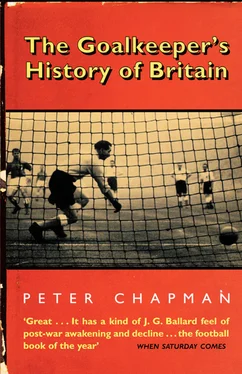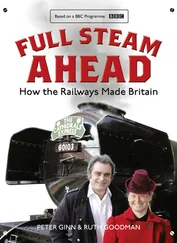My grandad spent weeks looking for a location to get them out to, then was reminded of his distant aunt whom his father used to run away to from Exmouth Market. The family, including my mum’s one-year-old brother Keith, and other members like Great-aunt Ada, moved to about 50 miles away in Sandy, in Bedfordshire, where they found a place over a shop in the High Street.
Grandad stayed behind. Not wishing to join the crowd down the Angel tube, he offered to build a shelter in the backyard. Mrs Clements said she and her middle-aged children, Stanley and Lily, who lived with her on the top floor, would refuse to use it. So he converted the cupboard under the basement stairs. For a while the four of them shared this, crouched on two narrow benches. Stanley, who wore a detachable starched collar and was clerk to a firm of window cleaners in Camden Passage, sat with a suitcase on his knees packed for a hasty exit. He bemoaned my grandad’s lack of similar preparation, and fretted he could hear the rattles of the air-raid patrol men signalling a gas alarm. Grandad soon opted for the relative peace and comfort of sleeping out the raids in the ground-floor parlour.
Number 25 succumbed quietly one night to an inextinguishable incendiary. When numbers 8 and 10 opposite went up, the blast blew the front parlour window over the room, but grandad was out working in Fleet Street. A bomb just along from the backyard took six houses out of the terrace in Gerrard Road. Two bombs which landed on the corners of Gerrard Road set off fears of a gas explosion and everyone was evacuated to Owen’s boys’ school, 300 yards away. Mrs Clements, Stanley and Lily left in such a rush they forgot to take their suitcase and any money and grandad had to buy them a cup of tea.
A few raids later a bomb dropped down a ventilation shaft into the basement of the girls’ school on the other side of the Owen’s playground. Many of the several hundred people sheltered there were killed either by the blast or by drowning when the water mains burst. Coming out of the Angel tube next morning on her monthly visit to make sure grandad was still intact, my nan said the scene was ‘like a pit disaster’. Not that she knew it, but her youngest sister and one of my grandad’s sisters, Mary, were still to be pulled out. Both walked away from it alive, Great-aunt Mary with a stick thereafter. Off-duty soldiers were taking advantage of the mayhem to throw their pass books into the smoke and debris to fake their own deaths.
Grandad’s oldest sister, Polly, lived in Finsbury by the Ironmonger Row baths, an area not easy to survive in at the best of times. If you didn’t know the precise address of the person you were visiting, it wouldn’t have done any good inquiring of the locals – they’d assume you were the police or a debt-collector. On her own initiative Polly had gone down to the Northern line platforms at Old Street every night since a week before the war began. The tube was not officially being used for the purpose at the time, the government being reluctant to allow people underground during the raids lest they give the impression of a nation cowering in fear. Polly went down throughout the first twelve months of the ‘phoney war’ and, when the bombing started, was so petrified she almost had to be carried down. St Luke’s church, the few feet across Ironmonger Row from her house, had been destroyed as she resurfaced after one raid. She died towards the end of the Blitz for no obvious reason. Her heart had been none too good, and my grandad said he was sure she’d been frightened to death.
Our street’s great escape came when a 1,000-pound bomb struck the chimney stack on Siddy Bates’s house at number 40. Had it hit and gone through the slates of the roof, much around the house would have gone with it. The sudden and looming presence of the barrage balloon might have jogged the bomb aimer’s elbow the fraction required. I imagined the outcome. The bomb bounced off the stack – solid brickwork – and sailed into the air again. In a high arc, a tantalising parabola, the bomb flew towards the end of the 60-foot garden. But where would it land? Maybe an old, mythical goalkeeper stood down there, calmly watching as it dropped – flat cap, roll-neck jersey, positioned on his line, jumping at the last moment (actually giving little more than a nonchalant skip) to make sure the threat passed over. With his upstretched hand he’d have set the crossbar swaying up and down a couple of times, just to reassure all concerned he’d had it covered. Immediately beyond the garden and towpath the bomb fell into the canal, where it exploded beneath the brown and accommodating sludge. Next morning my grandma was on one of her visits. As she walked from the Angel tube, she said, the mud was splattered across the roadways, pavements and housefronts for streets around.
Her father died when the raids seemed to have come to an end. In his eighties, blind and in a wheelchair, he’d been either unwilling or unable to leave London and had sat out the bombing in his own private darkness in his house in one of the small Finsbury streets off Goswell Road. The family returned from Sandy for the funeral, Great-aunt Ada going to join her son Teddy, who had stayed on in Carnegie Street. Everyone assumed the bombing was more or less over, but the evening before the funeral saw one of the worst raids yet. Ada left quickly to go to the shelter at the end of the street but it was nearly full and there was nothing to sit on. Teddy ran back and was killed in a direct hit on the house.
From the Caledonian Road an air-raid patrol man saw him on the doorstep, coming out of the house carrying what he said looked like a chair. My mum and her sister were not allowed to see him. They later worked it out from what little they were told that he had been decapitated. His body was not in too much of a state, however, to deter whoever removed his wallet. It was assumed to have been one of the ARP men, ‘good people as a rule’ but in that area often market boys and bookies’ runners. Great-aunt Ada was left to come to terms with the loss of her father and son within a few days of each other. She came back to Sandy two weeks later and the family met her at the station, none of them with any idea what to say. All she said was, ‘We just have to start all over again.’
My mum and dad met soon after the family arrived in Sandy and were married fifteen months later. He had to be back at an army camp in the north of England the next day and was promptly sent to Africa and Italy for four years. She worked in the Naafi by the market square in Biggleswade, making 3,200 pounds of slab cake a day for the navy, army and air force. My dad said the army never saw any of it. After the war he moved back to Islington with her. War brides usually followed their husbands, but she had not exactly warmed to the country. Locals had sometimes wondered what Londoners were making all the fuss about and, worse, referred to the family as ‘evacuees’. As my nan, in a rare state of vexation, was keen to point out, they had not left London like hundreds of thousands had as part of some state-dependent evacuation programme: ‘We got ourselves out.’ My father was also easily persuaded that demand for a bricklayer would be nowhere as high as in London.
I was born in the first week of the National Health Service in July 1948, in a stately home near Welwyn Garden City. The story had it that Lord Brocket, its former owner and a Member of Parliament in the 1930s, had been led astray by Sir Oswald Mosley, Britain’s moustachioed champion of fascism, after which the state required an act of noble penance. No mention of this was made on the plaque later put on the lobby wall: ‘By the kindness of Lord Brocket’, it said, he gave over his Hertfordshire home to expectant women who, but for the destruction of the maternity hospital in City Road, would have been accommodated nearer home. I was born in the room above the front door, once the chamber of Lord Palmerston before he sent in one British gunboat too many and became fatally entwined with a maid on Brocket Hall’s billiard table. Lady Caroline Lamb, an earlier resident, served herself up naked from a large silver tureen on the birthday of her husband and prime minister, Lord Melbourne. While Melbourne was away on higher affairs of Georgian state, Byron probably passed through for a few grabbed moments of warmth and verse. My mother said it was a cold and sparse place. After the customary ten days of confining us there, and in the absence of ambulances or other transport, we took a taxi back to London.
Читать дальше












